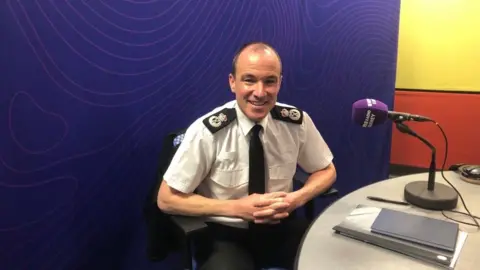Five takeaways from police chief in hotseat
 BBC
BBCSurrey's Chief Constable Tim De Meyer has been in the hotseat on BBC Radio Surrey.
He began his policing career with the Metropolitan Police in 1997 and joined Surrey Police in 2023.
In a wide-ranging interview, which you can listen to here, Mr De Meyer fielded questions from BBC Radio Surrey Breakfast presenter James Cannon.
Here are five takeaways from what he had to say…
1. Violence against women and girls
The issue is a priority for the Conservative Police and Crime Commissioner, Lisa Townsend.
There have also been a number of high profile incidents in Surrey over the last few years, including the shooting of the head teacher of Epsom College, Emma Pattison and her seven-year-old daughter, and the murder of 10-year-old Sara Sharif.
Mr De Meyer said there is a lot of effort and attention on this area, particularly domestic abuse.
"We have some of the most vulnerable people and the most dangerous people, together behind closed doors, and that is where officers spend an awful lot of time, where the victim…might have suffered abuse more than 30 times, or over three years, before they report it to us," he said.
"We have to seize that vanishingly brief opportunity to protect them now and in the future."
Mr De Meyer said they are also taking a new approach, by identifying and dealing with "the small number of people who we think are responsible for the greatest number of offences" and making use of specially trained officers.
2. Collaboration
Surrey Police works closely with other forces, particularly Sussex Police, in a range of different areas, such as information technology, personnel, firearms, roads policing, and dogs.
Mr De Meyer said that policing has had to make savings following years of austerity and, that if this type of collaboration did not happen, Surrey would need to make cuts in some areas, which the force would "not have been able to sustain" otherwise.
"Our collaborated officers will go and help with the policing of Brighton and Hove Albion in the Premiership, but our outstanding policing of the Epsom Derby over the last few years is very substantially attributed to the collaboration that we enjoy with Sussex as well," he said.
3. Police finances
The pressure on police finances was another big topic.
Surrey Police needs to save £18m over the next four years. The county's PCC, Lisa Townsend, has set her budget for 2025-2026, including a rise in council tax of 4.3%, which is £14 extra for a Band D property.
Mr De Meyer said he is not looking at cutting officers, like forces including Lincolnshire, and that there are "very comprehensive plans" to ensure those savings are made.
"What we are trying to do is, through improving technology and through improving processes, collaborating better with other forces on the sorts of services that the public wouldn't necessarily notice, such as the way we build our files for court, we can save that money in such a way that means that we can not only maintain our frontline services but also take advantage of new initiatives launched by the government to increase the number of neighbourhood officers," he said.
4. Bobbies on the beat?
When asked about what they want to see from policing, the public often say they want to see more officers out on the streets.
Mr De Meyer said he understands why people feel safer where they can see someone out on patrol and that there is a place for "high visibility policing".
But he said that its value can be "overstated" and there is a need to make the best use of resources to deal with different challenges, including the investigation of fraud and online paedophilia.
"We have to make some hard choices," he said.
"What I am trying to do in order to make sure I can meet all of those challenges, but also satisfy the public need and wish for visibility, is to identify our hotspots where there are persistent and resistant crime problems, the times of day when they are most prevalent and get the officers and PCSOs there at those times."
5. Charging rates
Mr De Meyer said that when he became chief constable, Surrey "wasn't where it needed to be," particularly around the charging of offenders.
He said the force had been at the bottom of league tables in comparison to other forces when it came to catching and charging criminals.
"You have to bring people to justice, get public confidence, earn their trust," he said.
"I'm very pleased to say that over the last 12 months, we've charged double the number of people we charged in the previous 12 months. That is 3,500 more people brought to justice for crimes like shoplifting, burglary, domestic abuse, rape than was previously the case. For that I'm extremely grateful to colleagues who've worked really hard."
Follow BBC Surrey on Facebook, on X. Send your story ideas to [email protected] or WhatsApp us on 08081 002250.
